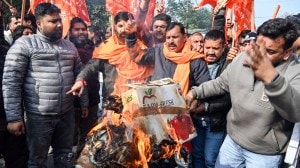Experience for sale; Farmer146;s DIY book is a big hit
Mohinder Singh Grewal makes for an unlikely marketing guru. A progressive farmer long before the term gained common currency, he gained his ...

Mohinder Singh Grewal makes for an unlikely marketing guru. A progressive farmer long before the term gained common currency, he gained his knowledge the old-fashioned way: hands on, trial and error. He has known years when the conventional wheat-rice rotation brought in no money, and years when he had to look after three standing crops simultaneously. In short, experience.
And now, that experience is available within the twin covers of a book, Safal Vaigyanik Kheti. And going by the response, at least in this part of the state, Grewal has a winner in his hands. Bulk orders are being despatched to Muktsar and Fatehgarh Sahib daily 8212; the book very clearly addresses local farmers 8212; and the book is currently being translated from Punjabi to Hindi.
But then, the 67-year-old is adapt at switching roles. A former Navy officer who quit the seas to take to farming in 1966 in Kanganwal village, Grewal is also an international footballer, having represented the services in South-East Asia in the 8217;60s.
8216;8216;I adopted a scientific, methodical approach towards farming in 1969, after three years of the rice-wheat rotation failed to yield any profits,8217;8217; says the farmer. 8216;8216;Thirty-four years down the road, I decided to record all the methods I had used in my fields so that farmers 8212; especially the youth, who are turning their back to agriculture because of low profits 8212; can once again earn from their fields.8217;8217;
Safal8230;, published by Grewal himself, has earned a certificate of approval from the Indian Council of Agricultural Research. The book, priced at Rs 200 for the general public and Rs 125 for cooperatives, brings together all the expertspeak on subjects as varied as bed-planting and inter-cropping to growing vegetables and adopting remunerative crops and adds Grewal8217;s own experience with operations and expenses.
His first mantra, though, is catering to the local demand. 8216;8216;In Ludhiana, the primary market for all us farmers around the city, the demand is the highest for fresh vegetables. So I grow vegetables on much of my 40 hectares of land, and I make more at the end of the day than farmers who sow only wheat and rice for sale at far-off mandis,8217;8217; says Grewal.
The wizened farmer also subscribes strongly to inter-cropping. 8216;8216;I grow mustard or sugarcane in my poplar fields, plant potatoes and carrots together, grow sugarcane alongside potatoes, and so earn twice the money I would than if I grew only one crop in a field,8217;8217; he says.
But if Grewal has one message for farmers, it is this: 8216;8216;No one will come and till our fields or market our crops, we have to use our own brains and hands. That is the objective behind my book.
8216;8216;I have made no recommendations, I am no scientist. I have only made suggestions based on the need of the day. Like, at the moment, it is imperative to save on input costs. The best way to do it is to keep a record of all expenses, no matter how minute.8217;8217;
Incidentally, this is not Grewal8217;s first book; he has already penned his autobiography and a collection of poetry. Safal8230;, however, is different: It has been recommended for inclusion in libraries and schools of various government schools.
- 01
- 02
- 03
- 04
- 05































